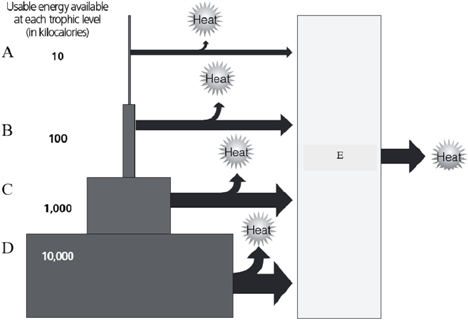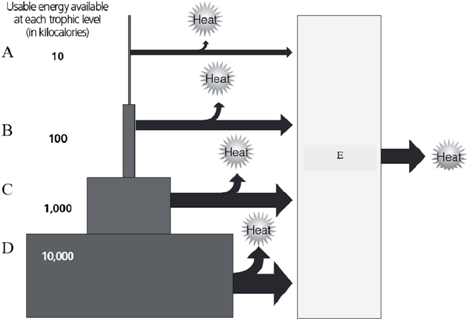Exam 3: Ecosystems: What Are They and How Do They Work
Exam 1: Environmental Problems, Their Causes, and Sustainability90 Questions
Exam 2: Science, Matter, Energy, and Systems90 Questions
Exam 3: Ecosystems: What Are They and How Do They Work90 Questions
Exam 4: Biodiversity and Evolution90 Questions
Exam 5: Biodiversity, Species Interactions, and Population Control90 Questions
Exam 6: The Human Population and Its Impact90 Questions
Exam 7: Climate and Biodiversity100 Questions
Exam 8: Aquatic Biodiversity93 Questions
Exam 9: Sustaining Biodiversity: The Species Approach90 Questions
Exam 10: Sustaining Terrestrial Biodiversity: The Ecosystem Approach90 Questions
Exam 11: Sustaining Aquatic Biodiversity90 Questions
Select questions type
If grass stores 1,000 energy units received from the sun, the ecological efficiency of the ecosystem is 10%, and the trophic levels are grass → cow → human, how many units of energy does the human receive of the original 1,000 units?
(Multiple Choice)
4.9/5  (31)
(31)
What is a primary link between photosynthesis and aerobic respiration?
(Multiple Choice)
4.9/5  (34)
(34)
What term describes groups of different species living together in a particular place with a potential for interacting with one another?
(Multiple Choice)
4.8/5  (35)
(35)
Organisms that convert simple inorganic compounds into nutrients, without sunlight, are called ____________________ .
(Short Answer)
4.8/5  (37)
(37)
 Use the accompanying figure to answer the following question(s). Why is heat shown as being lost to the environment?
Use the accompanying figure to answer the following question(s). Why is heat shown as being lost to the environment?
(Essay)
4.9/5  (33)
(33)
The oceans of the earth cover approximately what percentage of the earth's surface?
(Multiple Choice)
4.7/5  (34)
(34)
The most fundamental structural and functional units of life are ____.
(Multiple Choice)
4.8/5  (34)
(34)
Methane, CO2, and water vapor make up about 30% of the earth's troposphere.
(True/False)
4.9/5  (40)
(40)
In the plains states of the U.S. (Kansas, Nebraska, Texas, etc.), agricultural withdrawal of groundwater from aquifers has greatly exceeded the supply. Explain why removal of this resource will have long-term effects on the hydrologic cycle.
(Essay)
4.8/5  (31)
(31)
Which terrestrial ecosystem or life zone produces the highest net primary productivity per year?
(Multiple Choice)
4.7/5  (36)
(36)
____________________ refers to how fast producers can make the chemical energy that is stored in their tissues and that is potentially available to other organisms (consumers)in an ecosystem.
(Short Answer)
4.8/5  (37)
(37)
Each trophic level in a food chain or food web contains a certain amount of organic matter, called ____.
(Multiple Choice)
4.8/5  (24)
(24)
 Use the accompanying figure to answer the following question(s). Letter D, at the base of the pyramid given above, represents what group of organisms?
Use the accompanying figure to answer the following question(s). Letter D, at the base of the pyramid given above, represents what group of organisms?
(Short Answer)
4.9/5  (31)
(31)
The hydrosphere is the earth's intensely hot core, thick mantle composed mostly of rock, and thin outer crust.
(True/False)
4.9/5  (33)
(33)
The three major processes in the water cycle are ____________________, ____________________, and ____________________.
(Short Answer)
4.9/5  (38)
(38)
Because carbon makes up such a small amount of the earth's atmosphere, even a small change, caused by nature or by humans, affects the earth's climate.
(True/False)
4.9/5  (34)
(34)
Showing 41 - 60 of 90
Filters
- Essay(0)
- Multiple Choice(0)
- Short Answer(0)
- True False(0)
- Matching(0)